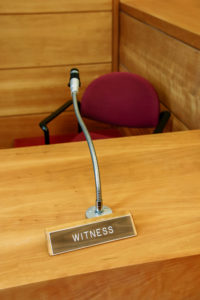Your Divorce Trial: If You Absolutely Must
Cobb County Divorce Trial
A divorce trial is the last place you want to be. If you’re in a trial, that means that you’ve had no other choice than to lay your personal and financial wellbeing in the hands of a stranger (the judge) who doesn’t know your life and who gets paid the same whether she is particularly helpful to you or not. Any attorney who tells you that your trial is a sure shot is either inexperienced or not looking out for your best interests.
What is a Divorce Trial?

Judge or Jury?
Almost all divorce trials are decided solely by a judge. Very few divorces are tried to a jury, often because the expense of a jury trial is much greater than a “bench trial” – a trial only before a judge. While juries can decide issues of alimony, property division, and child support, they cannot make decisions on child custody.
Sequence of Events in a Divorce Trial
Opening Statements
A trial begins generally with opening statements by the attorneys. The Plaintiff’s attorney goes first. Some judges will be very “active” during opening statements and will ask a lot of questions about the issues to be decided. They will often ask for details about the parties’ assets, debts, and children. Each attorney should be prepared to lay out for the judge the issues involved and that Client’s position on each issue. For example:
- “The parties have $1 million in assets composed of real estate, retirement accounts, and cash accounts, and they have $600,000 in debt consisting of mortgages, credit cards, and lines of credit. We will be asking the court to award the parties’ marital residence to my Client and assign the debt to the opposing party.”
Evidence
After opening statements, the Plaintiff presents evidence in support of its positions. Evidence is in one of two forms:
- Testimony
- Testimony comes from the spouses, any expert witnesses like real estate appraisers or financial experts, and other fact witnesses.
- Documents.
- Documents introduced as evidence vary, but most divorce trials involve the introduction or “tender” of bank statements, tax returns, pay records, asset balances, etc.
- Very often, documents such as text messages, social media posts, and emails are introduced, and they rarely cast the opposing party in a favorable light.
After the Plaintiff presents all of its evidence, the Defendant gets a turn and introduces its own evidence and often rebuts or disputes the Plaintiff’s evidence.
Closing
Once both parties have presented all their evidence, the judge will typically hear closing arguments from the attorneys. Closing arguments are used not only to summarize the evidence but to “argue” how that evidence should be viewed (e.g. “Plaintiff should get this asset for these reasons.”). In a closing argument, the Plaintiff’s lawyer has the right to “open and conclude,” meaning that lawyer gets to go first with the opening statement, sit down, listen to the Defendant’s closing statement, and then get the last word with another final statement.
Ruling
Following the closing arguments, the case is in the judge’s hands for final decision. The parties no longer have any right to make requests, change the evidence, or settle the case. The judge is not bound in any way by the parties’ requests for how the issues should be resolved.
Final Thoughts
Most judges presiding over divorce trials are good people, and they want to do the right thing. That usually means that neither side gets entirely what s/he wants. It also means that the judge’s ruling will reflect what the judge thinks is important, and that may not necessarily reflect what’s important to the parties. I conclude with these parting words of wisdom from a great trial lawyer:
“Discourage litigation. Persuade your neighbors to compromise whenever you can. Point out to them how the nominal winner is often a real loser — in fees, expenses, and waste of time. As a peacemaker the lawyer has a superior opportunity of being a good man. There will still be business enough.”
– Abraham Lincoln
